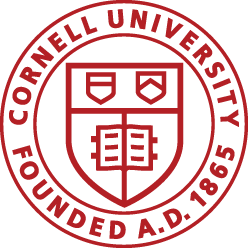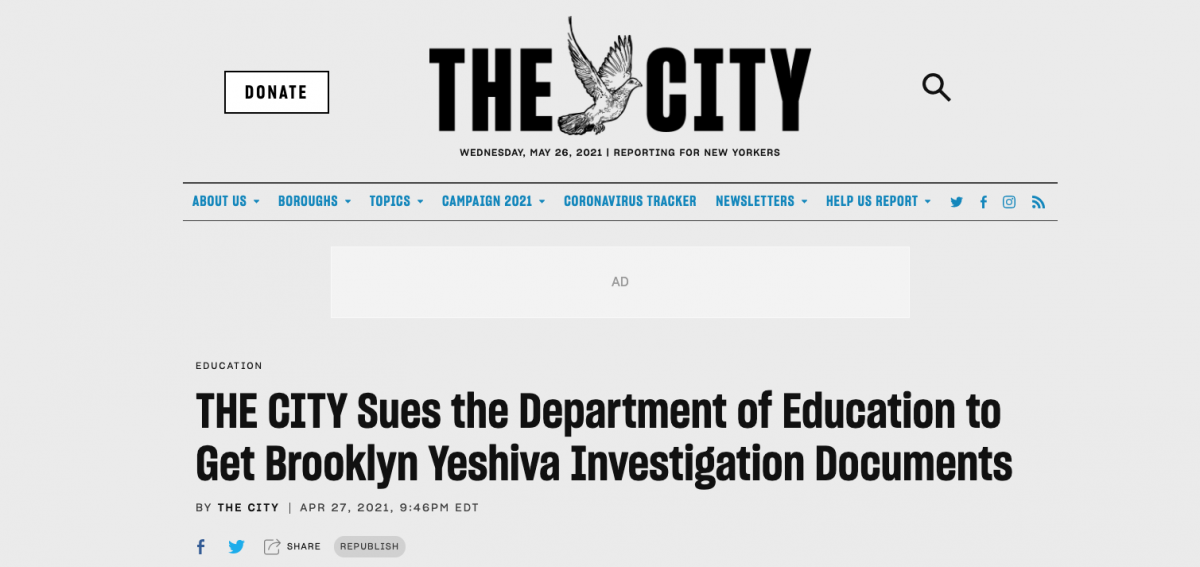By James Dean | Cornell Chronicle
May 14, 2021
A decision in a defamation case argued primarily by a Cornell Law School student is one of the first in New York state court to address a legal question spurred by recent legislative changes strengthening free speech protections.
On May 10, a New York Supreme Court judge in Ontario County dismissed a construction company’s lawsuit against James Meaney of Geneva, New York, publisher of the Geneva Believer watchdog blog, who was defended by the Law School’s First Amendment Clinic and co-counsel Michael Grygiel of Greenberg Traurig LLP.
Judge Brian Dennis agreed that amendments approved in November to New York’s so-called “anti-SLAPP” statutes, which seek to deter use of the courts to silence criticism in public matters, should apply to the case retroactively. But he also found that the previous version of the statute would have applied as well, and that Massa Construction Inc. could not meet its statutory burden to show that its claims had a substantial basis in law and fact. Dennis ruled that Meaney’s challenged articles were comprised of true facts and constitutionally protected opinions, rejecting Massa’s theory of defamation by implication and holding that satirical images in the articles were non-actionable.
During a virtual hearing on Dec. 9, 2020, third-year law student Rob Ward led the defense team’s argument for why the amended anti-SLAPP laws – short for Strategic Lawsuits Against Public Participation – should apply retroactively.
State and federal judges have recently reached that conclusion in unrelated cases, but at the time of the hearing no courts had weighed in on the matter.
Ward pointed to legislative history revealing state lawmakers’ intent to clarify the original purpose of statutes enacted in 1992, which was for the statute to apply more broadly than courts have previously interpreted it, and for the amendments to take effect immediately.
“New York has a long history of being at the forefront of expansive definitions of free expression,” Ward said. “This decision helps build on that tradition and will help protect journalists and other citizens trying to make their voices heard in their communities.”
The victory was the First Amendment Clinic’s second on Meaney’s behalf since Massa filed its defamation claim in January 2020. Last June, the same court on First Amendment grounds denied Massa’s request for a temporary restraining order demanding Meaney take down articles reporting on the company’s ties to the Geneva city council, which according to Meaney’s reporting has awarded Massa more than $4 million in contracts since 2010.
Meaney’s articles highlighted potential conflicts of interest involving a city council member who was also a Massa employee, and a former council member whose son worked part-time for both the company and the city. He reported on missing bid records – revealed by his Freedom of Information Law requests – and questioned the rationale for certain projects.
The First Amendment Clinic said the defamation case lacked merit broadly, including the fact that Meaney’s reporting – based on public meetings and public records – was accurate. The company claimed the allegedly defamatory statements implied wrongdoing and corruption – a disfavored legal theory, according to First Amendment Fellow Tyler Valeska.
Meaney’s reporting on and criticism of the city’s spending “is protected at the core of the First Amendment and the New York Constitution as speech on a matter of public concern,” the defense team argued in requesting the case be dismissed.
Valeska was thrilled with the comprehensive victory. He emphasized the court’s conclusion that Meaney would have been protected even under the narrower prior version of New York’s anti-SLAPP law. And he noted that the amended laws, applied retroactively, made the case a slam dunk. Application of the anti-SLAPP law increased Massa’s burden of proof, facilitated the case’s early dismissal and entitled Meaney to collect attorney’s fees.
The case was part of the First Amendment Clinic’s Local Journalism Project, which supports newsgatherers and media outlets lacking the resources to defend themselves against expensive, potentially frivolous litigation. Associate Director Cortelyou Kenney and a group of students including Michael Mapp were also part of the clinic team handling the case.
“The clinic believes that such threats have a dangerous chilling effect on local journalism and must be fought to ensure that the public receives newsworthy information,” said Mark Jackson, the clinic’s director and adjunct professor of law.
For Ward, helping to shape a novel aspect of state law was a rewarding opportunity, one that is relatively rare for a law student.
“I was grateful to play a role in defending this journalist who, if the clinic weren’t here, might have had to stop publishing,” Ward said. “Getting to not only write on his behalf but to argue before a judge on his behalf was an amazing experience.”
Ward said the skills and courtroom experience gained during his three semesters in the clinic will serve him well in a career that will start in tax law, and that First Amendment issues will remain a passion. Meaney’s challenges in Geneva, a city of 13,000, resonated personally with the native of Broadalbin, New York, a town of 5,000 about an hour northwest of Albany in Fulton County.
“This case hit close to home,” he said. “It was really appealing to me to work with someone who cares about his upstate New York community and is trying to report on it and make it a better place.”



